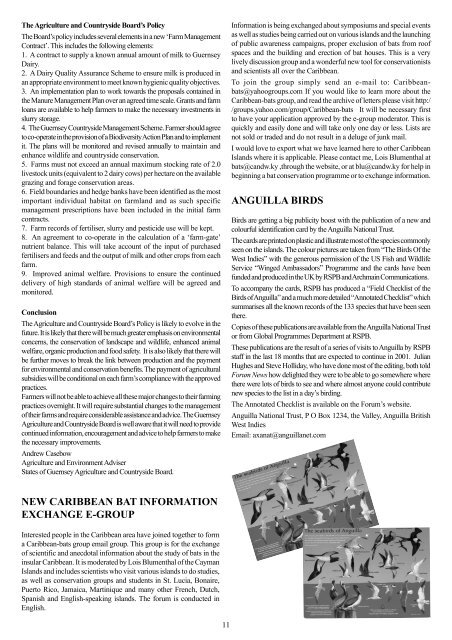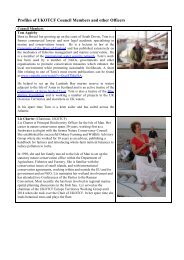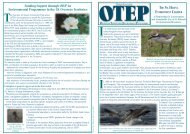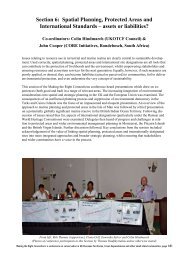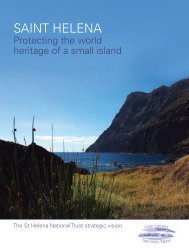Issue 20 - UKOTCF
Issue 20 - UKOTCF
Issue 20 - UKOTCF
You also want an ePaper? Increase the reach of your titles
YUMPU automatically turns print PDFs into web optimized ePapers that Google loves.
The Agriculture and Countryside Board’s Policy<br />
The Board’s policy includes several elements in a new ‘Farm Management<br />
Contract’. This includes the following elements:<br />
1. A contract to supply a known annual amount of milk to Guernsey<br />
Dairy.<br />
2. A Dairy Quality Assurance Scheme to ensure milk is produced in<br />
an appropriate environment to meet known hygienic quality objectives.<br />
3. An implementation plan to work towards the proposals contained in<br />
the Manure Management Plan over an agreed time scale. Grants and farm<br />
loans are available to help farmers to make the necessary investments in<br />
slurry storage.<br />
4. The Guernsey Countryside Management Scheme. Farmer should agree<br />
to co-operate in the provision of a Biodiversity Action Plan and to implement<br />
it. The plans will be monitored and revised annually to maintain and<br />
enhance wildlife and countryside conservation.<br />
5. Farms must not exceed an annual maximum stocking rate of 2.0<br />
livestock units (equivalent to 2 dairy cows) per hectare on the available<br />
grazing and forage conservation areas.<br />
6. Field boundaries and hedge banks have been identified as the most<br />
important individual habitat on farmland and as such specific<br />
management prescriptions have been included in the initial farm<br />
contracts.<br />
7. Farm records of fertiliser, slurry and pesticide use will be kept.<br />
8. An agreement to co-operate in the calculation of a ‘farm-gate’<br />
nutrient balance. This will take account of the input of purchased<br />
fertilisers and feeds and the output of milk and other crops from each<br />
farm.<br />
9. Improved animal welfare. Provisions to ensure the continued<br />
delivery of high standards of animal welfare will be agreed and<br />
monitored.<br />
Conclusion<br />
The Agriculture and Countryside Board’s Policy is likely to evolve in the<br />
future. It is likely that there will be much greater emphasis on environmental<br />
concerns, the conservation of landscape and wildlife, enhanced animal<br />
welfare, organic production and food safety. It is also likely that there will<br />
be further moves to break the link between production and the payment<br />
for environmental and conservation benefits. The payment of agricultural<br />
subsidies will be conditional on each farm’s compliance with the approved<br />
practices.<br />
Farmers will not be able to achieve all these major changes to their farming<br />
practices overnight. It will require substantial changes to the management<br />
of their farms and require considerable assistance and advice. The Guernsey<br />
Agriculture and Countryside Board is well aware that it will need to provide<br />
continued information, encouragement and advice to help farmers to make<br />
the necessary improvements.<br />
Andrew Casebow<br />
Agriculture and Environment Adviser<br />
States of Guernsey Agriculture and Countryside Board.<br />
Information is being exchanged about symposiums and special events<br />
as well as studies being carried out on various islands and the launching<br />
of public awareness campaigns, proper exclusion of bats from roof<br />
spaces and the building and erection of bat houses. This is a very<br />
lively discussion group and a wonderful new tool for conservationists<br />
and scientists all over the Caribbean.<br />
To join the group simply send an e-mail to: Caribbeanbats@yahoogroups.com<br />
If you would like to learn more about the<br />
Caribbean-bats group, and read the archive of letters please visit http:/<br />
/groups.yahoo.com/group/Caribbean-bats It will be necessary first<br />
to have your application approved by the e-group moderator. This is<br />
quickly and easily done and will take only one day or less. Lists are<br />
not sold or traded and do not result in a deluge of junk mail.<br />
I would love to export what we have learned here to other Caribbean<br />
Islands where it is applicable. Please contact me, Lois Blumenthal at<br />
bats@candw.ky ,through the website, or at blu@candw.ky for help in<br />
beginning a bat conservation programme or to exchange information.<br />
ANGUILLA BIRDS<br />
Birds are getting a big publicity boost with the publication of a new and<br />
colourful identification card by the Anguilla National Trust.<br />
The cards are printed on plastic and illustrate most of the species commonly<br />
seen on the islands. The colour pictures are taken from “The Birds Of the<br />
West Indies” with the generous permission of the US Fish and Wildlife<br />
Service “Winged Ambassadors” Programme and the cards have been<br />
funded and produced in the UK by RSPB and Archmain Communications.<br />
To accompany the cards, RSPB has produced a “Field Checklist of the<br />
Birds of Anguilla” and a much more detailed “Annotated Checklist” which<br />
summarises all the known records of the 133 species that have been seen<br />
there.<br />
Copies of these publications are available from the Anguilla National Trust<br />
or from Global Programmes Department at RSPB.<br />
These publications are the result of a series of visits to Anguilla by RSPB<br />
staff in the last 18 months that are expected to continue in <strong>20</strong>01. Julian<br />
Hughes and Steve Holliday, who have done most of the editing, both told<br />
Forum News how delighted they were to be able to go somewhere where<br />
there were lots of birds to see and where almost anyone could contribute<br />
new species to the list in a day’s birding.<br />
The Annotated Checklist is available on the Forum’s website.<br />
Anguilla National Trust, P O Box 1234, the Valley, Anguilla British<br />
West Indies<br />
Email: axanat@anguillanet.com<br />
NEW CARIBBEAN BAT INFORMATION<br />
EXCHANGE E-GROUP<br />
Interested people in the Caribbean area have joined together to form<br />
a Caribbean-bats group email group. This group is for the exchange<br />
of scientific and anecdotal information about the study of bats in the<br />
insular Caribbean. It is moderated by Lois Blumenthal of the Cayman<br />
Islands and includes scientists who visit various islands to do studies,<br />
as well as conservation groups and students in St. Lucia, Bonaire,<br />
Puerto Rico, Jamaica, Martinique and many other French, Dutch,<br />
Spanish and English-speaking islands. The forum is conducted in<br />
English.<br />
11


